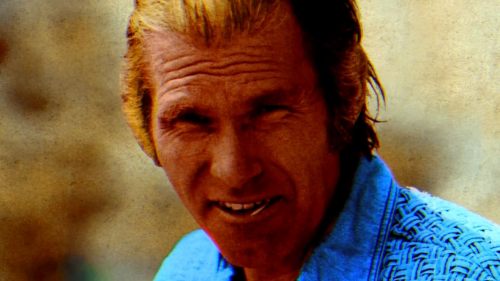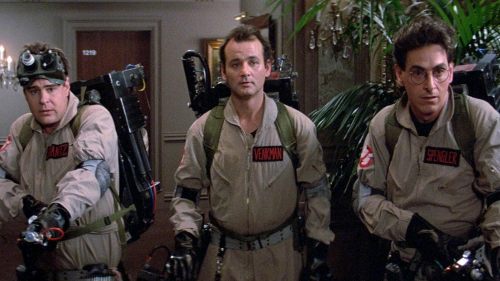Collins’ Crypt: Richard Franklin Made Great Films From Bad Ideas
Last week, the 1981 thriller Road Games joined the ever-expanding library of Scream Factory special editions, offering a plethora of bonus features with the actors, composer Brian May, and of course, director Richard Franklin. While it's got plenty of exclusive material (including a new interview with Stacy Keach and a commentary with the DP and some other key crew members), everything with Franklin is of course older, as the filmmaker passed away from cancer in 2007, at the relatively young age of 58 and still working (his last film, Visitors, was only a few years old at that point). It's a shame he died so young anyway, but it's even more distressing when you consider that it happened before the release of Not Quite Hollywood, which shined a light on the underrated filmmaker and earned him a number of new fans.
Granted, not all of his films are must-sees, though all the ones I've seen are enjoyable at the very least, and some are genuinely great. And what I find interesting about his best movies is that they all seem like bad ideas on paper. A PG thriller that's mostly about a guy talking to himself as he drives a truck through the Outback? A horror-thriller where the villain never leaves his bed? A sequel to Psycho??? If I'm a producer I don't put much stock in any of these being particularly good or successful, let alone both, but the resulting movies (Road Games, Patrick, and Psycho II, respectively) are top-notch efforts. Credit must be given to the writers of these films of course, especially Everett de Roche who wrote several of Franklin's films (Psycho II and his followup Cloak and Dagger were both written by Tom Holland), but Franklin's admitted worship of Alfred Hitchcock had him bringing a number of things to the table that would have made the master proud.
Which is of course part of why Psycho II works as well as it does - he wasn't trying to bring his own unique style to it the way other filmmakers might (including Anthony Perkins himself, as Psycho III is very un-Hitch like), allowing the film a continuity with the original that smoothed over most of the "this is a bad idea" sentiment almost instantly. By bringing back Perkins as Norman, plus Vera Miles as Lila Crane (now Lila Loomis - Sam, you dog!) and shooting on the same Univeral backlot, the lack of a Hitchcock cameo and maybe some of its more violent images are basically the only things that might be different had the Master been convinced to just do the film himself. Wisely ignoring Robert Bloch's own sequel novel, the film picks up 22 years later and finds a cured Norman released from the institution (Bloch's novel had him escaping) and allowed to return home. Before long, it seems that "Mother" has come back - but is Norman cracking, or is someone trying to frame him?

There are a number of good twists in Holland's script, but what really gives the film an edge is that Holland and Franklin manage to easily make Bates a sympathetic character again, even though we know he murdered several people. You really pull for the guy and want him to overcome his demons, even as the body count rises and he all but admits to doing it (he doesn't remember doing anything but chalks it up to "Mother" taking over again). Franklin delivers a few knockout suspense scenes and has a lot of fun using our knowledge of the first film to serve up some dark humor (Meg Tilly innocently handing Perkins a knife in the above scene is an all-timer sight gag), and gets a terrific performance from his marquee star, who at the time had mostly been doing television work.
Tilly is great, too, but it's fun to think about the idea of Jamie Lee Curtis in the role of Marion Crane's niece, as was the original idea of producer Hilton Green. Not only would it get around the usual casting problem of "they look nothing like their supposed family members" since Jamie is of course the daughter of Marion herself, Janet Leigh, but it also would have reteamed her with Franklin - and given her more to do. Despite the marketing team's best efforts, Jamie doesn't appear all that much in Road Games - she doesn't show up until the 40-minute mark, and basically exits again about twenty minutes later, only to pop up again at the very end of the 100-minute film. The real star of the film is Stacy Keach as Quid, a man who "drives a truck, but is not a truck driver", who believes he saw a man dispose of a body outside of a motel and then keeps seeing the man's van as he makes his way to deliver a truck full of meat. Jamie is a hitchhiker he picks up along the way, but when he clues her into his current dilemma she hops in the man's van at a later stop, hoping to get some info. Will she be the next victim? Or is the man innocent of any wrongdoing anyway?
So yes, it's basically a road movie version of Rear Window, with the ticking clock of getting the delivery there on time more or less confining Keach to his driver's seat the way James Stewart is stuck in his wheelchair. Franklin wrings suspense in the expected spots - a forced weigh station stop keeps Quid from remaining on the possible killer's tail being one highlight - but it's closer to comedy at times, as Keach is dryly hilarious with his observations and remarks about other drivers. Anyone who has ever had to drive a long distance on their own can recognize and sympathize with his behavior, the way he makes up names and backstories for the other cars around him, making games out of various sights, etc., and Keach makes it just as enjoyable as the serial killer plot. The film is rated PG, so there's almost no on-screen violence, but the comedy/thriller blend works so well you'll probably never notice. And you have to love a road movie that ends on a chase that, as Franklin notes on his commentary, "gets slower as it goes", as Quid's truck tries to make its way through an ever-narrowing alleyway.

Other than that climactic moment, the villain can MOVE here, which must have been a relief after Patrick's eponymous antagonist never even as much as blinked (nor did he speak aloud). The 1978 film, like Road Games, combines suspense with dry humor in a plot that keeps things a little more static than one might expect from a thriller. And it's got a bit of a nod to Psycho right off the bat (Patrick kills his mother and her lover), allowing Franklin to dive right into the Hitchcock adulation he'd be best known for and truly make his mark as a filmmaker. Technically this was his third film after a sex comedy and a full-blown softcore adult film, but this is the first "Richard Franklin film", and as a debut it's a pretty strong one - the pacing can be a little sluggish at times, but the fact that he was able to make Patrick a compelling and scary villain when he never moved (he used telekinesis to commit his deeds) is testament to the skill he was still improving upon.
Interestingly, the film was remade by Not Quite Hollywood director Mark Hartley, who made his own feature film debut here after a few documentaries. I didn't care for his update for the most part, but I do appreciate how reverential it was to Franklin's film - Charles Dance's character is even listening to Brian May's original score at one point. It was like a nice passing of the torch kind of thing, as Franklin would pay homage to Hitchcock, now filmmakers could do the same for him. His post Psycho II films (such as Cloak & Dagger, Link, and F/X 2) may not have struck the same chord with audiences then or now, but he gave them as all and continued to pay tribute to his idol in a variety of fun ways (Cloak & Dagger is a children's film, but it involves spies and secret files, both frequent Hitchcock subjects).
Since most people that would want to have probably seen Psycho II by now, and Patrick's a bit of a tough sell (especially nowadays; he spends a chunk of the movie telekinetically demanding a handjob from his nurse), I hope folks are willing to give Road Games a shot. It's unfortunately sometimes lumped in with Jamie Lee's slasher work of the era, and if you watch it expecting that kind of film you will walk away quite disappointed - and even Curtis herself has dismissed it in the past (to be fair, she is not a horror fan in general anyway). Plus it's been a bit hard to find over the years as the discs go in and out of print, so it's nice that it'll be readily available for both fans and those who are simply curious. And if you're a fan of Franklin in general, the disc's wealth of bonus material featuring the man is a true gift, as his early death means what little we have available now is likely all we will ever get.



